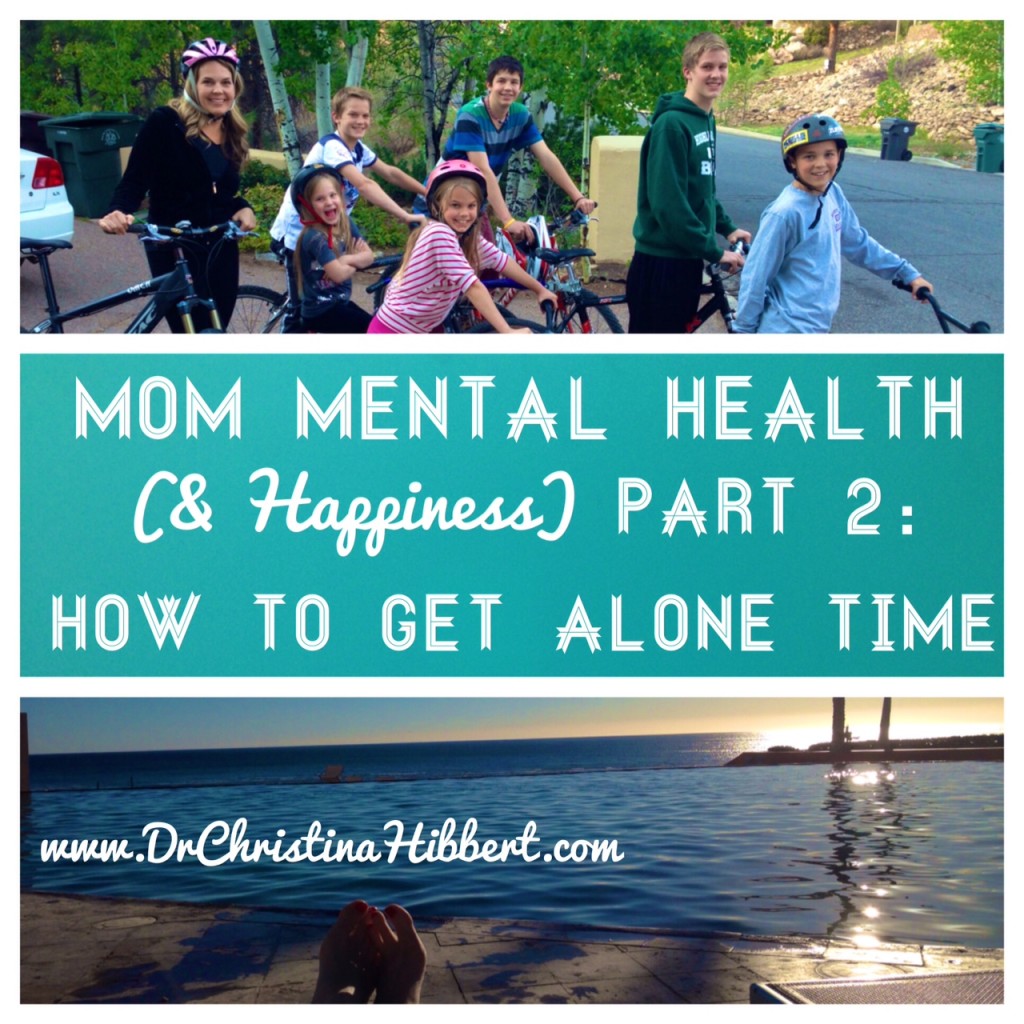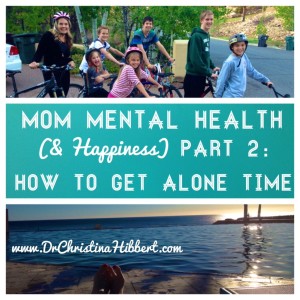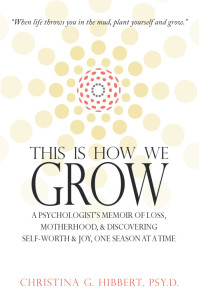
05 Apr Mom Mental Health (part 2): HOW to Get “Alone Time” (25+ Strategies!)
 In part 1, we discussed the importance of “alone time” for mom mental health and happiness. Today, we focus on HOW to actually make that happen.
In part 1, we discussed the importance of “alone time” for mom mental health and happiness. Today, we focus on HOW to actually make that happen.
HOW to get “Alone Time”
That’s the number one thing I hear from moms when I’m helping them learn to prioritize alone time: “I know I need it. I desperately want it, but it feels impossible to actually make it happen.” Believe me, after 18 years of marriage, 17 years of parenting, and six kids of various ages and stages, I know this feeling well. But I can also attest that it’s NOT impossible. It just takes a little work to get the alone time you need.
There are basically 2 steps…
Step 1: Prioritize and commit to alone time. We talked all about this in part 1, so if you’re not convinced, go check it out and keep rereading until you are! The truth is you will never get alone time until you make it a priority. It’s a sad truth, but so it is. No one else can do it for you; you have to take the lead and work to make it happen.
Step 2: Gather support. Even if you want to make it happen, it usually won’t happen all by yourself. You need support. Here are some tips to gather it…
Watch this 3-Minute Therapy video on my YouTube channel on Motherhood Mental Health: How to Get “Alone Time,” then, keep reading, below!
[stream provider=youtube flv=http%3A//www.youtube.com/watch%3Fv%3DxLHujqmLR-4 img=x:/img.youtube.com/vi/xLHujqmLR-4/0.jpg embed=false share=false width=640 height=360 dock=true controlbar=over bandwidth=high autostart=false responsive=16:9 /]
Get your husband/partner on board.
When I posted part 1 on the importance of alone time the other day, I heard several FB comments like, “Can someone please get my husband on board with this? Lol.” I know some partners are more likely to get on board than others, but these suggestions can help:
- Teach him the importance of alone time for you. Make sure he understands why you’ve come to value time alone, or away from your role as a mom, and how it can help you be healthier and happier. (Read Improve Communication=Improve Relationships. Improve Yourself.)
- Validate his need for “alone time,” too. It definitely helps when he feels like you’re on board with what he needs (i.e. time for sports, to hang with friends, to do whatever he loves). Help him see how you need this, too. When you’re both able to get a break, it only makes you stronger—individually, as parents, and as a couple. (Read Couples & Romantic Love: 9 Ways to Improve Intimacy in Relationships)
- Help him see the benefits of your time away. Come back happier, grateful, and refreshed, and he’ll begin to see that everyone benefits when mom is whole again. (My husband has literally pushed me out the door or into my room at times for this very reason. “You need to go away now, and I know you’ll feel better, and so will we all,” he says. This, of course is after years of teaching him.) (Read 17 Ways to Make Marriage Work)
Get your friends/family on board.
Especially if you are a single mom or have an unsupportive partner, this is important, but it’s really important for all of us.
- If you live near family, ask them to help watch your kids or drive them to activities so you can get a couple hours alone.
- Trade babysitting with friends so you both get a break. (Read Women & Friendship: The ABC’s of Making & Keeping Friends)
- Start a babysitting co-op with several friends. You each put in your time, then you get hours that are all for you—to do a project, relax, or go have some fun.
- Hire babysitting help. Sometimes you have to pay for a break, but believe me, it’s worth the money to keep yourself mentally, emotionally, physically, and spiritually strong and happy.
Get your kids on board. As your kids grow, they need to learn about the importance of mom alone time, too. It not only helps you get the time you need; it shows them how to get their own needs met, too.
- If you have a baby, nap times have to be “down time” for you. If you also have older children, then it becomes quiet time for everyone. Even children as young as two or three can learn to lie down, listen to quiet music, look at books, or play quietly in their beds while you get a break in your room.
- As kids grow, teach them why alone time matters. Teach them how we all need a break sometimes, and why this is what you need. Encourage them to take breaks and seek alone time when they feel overwhelmed or stressed, too. Kids are so over-connected these days, with electronics, they need to learn how to spend time thinking, feeling, experiencing real life. I tell my kids all the time, “It’s good to be alone sometimes. If you’re bored, good. It’s good to be bored because it gives you time to figure things out.” (ReadParenting Success: It’s More About the Parent Than the Child)
- Older kids can definitely be taught to respect your alone time. Help them see how much better you are after you get a little time away. Make a deal: “If you leave mom alone for an hour, I’ll come out and play after, or take you somewhere, etc.” I also educate my kids all the time, “Let me have my time or ‘mean mom’ is gonna show up.” They know all about “mean mom,” and how she gets when she’s way too tired. They’ve learned to let me be.
- Older kids and teens can also help by watching younger siblings, taking them to the park or away for a “date,” and helping fill the gaps when you’re taking a break. My oldest son who drives takes my littlest (or even all the kids) away for ice cream, to the park, or even our to lunch sometimes. She loves the time she gets to spend with her older brothers, and I love the time I get to spend alone. (Read Parenting Teens: Am I Doing a Good Enough Job?)
Other Tips/Strategies/Crazy Suggestions that just might work…
For You

I love this picture I took on our family trip to Mexico. Even during “family time,” it’s good to take a little “mom time.”
- This is important: You must actually ASK for help with your alone time. Don’t expect him to just figure it out. “I looked OJ in the eye and said the words today,” I write in This is How We Grow. “’I need help. I need a break.’ It’s one lesson I’ve learned well. If I don’t ask, it won’t happen.” (p. 343)
- There’s no set amount of time away that works for everyone, and at different stages of life your needs and ability to get what you need will change. With newborns, it may just be 15 minutes sitting outside, writing in your journal, or a couple hours going to Target (until baby needs to eat again). With older kids, you can definitely shoot for an hour a day most days or a few hours a week. And eventually, you can get away for a few days either as a couple, with friends, or yes, even all alone. (Read Recharge: Lessons Learned from Solitude)
- Do what’s right for you. Not everyone has the same “alone time” needs, so figure out what yours are, and then get them met. Though it may feel hard to do, it really is that simple.
Husbands/partners
- When first starting out, try time-for-time. My husband and I started this when our kids were little. If he went golfing for five hours on Friday, I got five hours on Saturday to spend however I wanted.
- As kids grow older and your understanding of mutual alone time matures, you can forget time-for-time and instead just focus on helping each other take breaks as needed. After 18 years of marriage, my husband is the first to encourage me to go into my room and rest, to threaten the kids to leave me alone when I need a break, and to suggest I take a little time away from home for a day or two when I really need a break. In return, I support his frequent golf tournaments, trips, and time with buddies playing basketball or dirt biking. We’re both so much happier when we get a little time to recharge.
- Be patient and keep working on it. Even if your hubby is willing to be in charge, it doesn’t mean it will always work. I’ve had so many times when he was supposedly in charge of the kids but they were constantly sneaking past him, interrupting “my” time. He’s finally learned to set up a barrier and pay a little closer attention, but be patient. As long as they’re trying, encourage them to keep at it.
- After he comes home, give him some time to relax for a bit, then trade off and hand the kids over. He can sit with the baby while you take a bath, and yes, he can even take turns putting the kids to bed so you can be “free” for a night.
Friends/Family
- Start a preschool co-op with young children where each mom takes turns teaching for a week. This can give you several weeks off for at least a few hours.
- Get away with your significant other for a weekend of romance, fun, and/or relaxation by enlisting family members to watch your kids.
- Ask for “babysitting coupons” as holiday/birthday gifts. My parents always give me a “weekend of babysitting” for my birthday now, and believe me that is way more valuable to me than any store-bought gift could be (especially because, with six kids it’s hard to find anyone else willing to stay with them! Except my fabulous mother-in-law, of course)
- I admit, I have locked myself in my bathroom or closet several times just to get a few minutes of quiet. Even ifthey’re crying outside the door, sometimes those few minutes can get me recentered enough to go back out and handle things with grace.
- Ever since my youngest learned to read, we’ve also started using sticky notes. My husband posted this one, right, last weekend, when I was desperate for a good night’s sleep. I slept for 11 hours straight! A miracle! And when my hormones come to wreak havoc on my emotions I’ve been known to post a “Quarantine” sign: “Do not come in, or you will suffer the consequences.” All my family members have learned to respect that sign.
- Time-for-time can also work for kids. Explain you’ll give them x amount of quality time together or doing what

One Saturday, after my kids had helped me get a little time alone, I took them for a family bike ride. I win. They win. We all win when mom gets time alone.
they love if they help you get x amount of time for you. Win-win. (Also, try this: Give Kids the first 10 minutes!)
- And yes, movies and TV shows can be great to buy you a little time. A lot of moms feel guilty plopping kids in front of the tube, but remember this is buying you mental health and happiness. And there’s nothing more important for kids’ growth and development than a healthy, happy mom.
What helps you get “alone time?” Share your strategies and thoughts by leaving a comment, below!
Read Part 1: Mom Mental Health (& Happiness)-The Importance of Alone Time
Be sure to check out Dr. Hibbert’s Amazon Bestseller, This is How We Grow–
available now on Amazon.com!
Join my This is How We Grow Personal Growth Group!
FREE. Online. Growth. What more could you ask for?
Don’t miss a thing!
SUBSCRIBE, below, “like” my Facebook pages (Dr. Christina Hibbert; This Is How We Grow) and follow me on Twitter,Pinterest, & Instagram!
You may manage your subscription options from your profile
Related Articles/Posts:
Mom Mental Health (& Happiness): The Importance of Alone Time (part 1) (+video)
Recharge: Lessons Learned from Solitude
Parenting Success: It’s More About the Parent Than the Child
Parenting Success Skills: Top 10, #1 Do Your Own Work First
Parenting Teens: Am I Doing a Good Enough Job?
The 3 Layers of Self-Care: Build a Healthier, Happier YOU!
Beyond Happiness: 10 Ways to Increase Joy
“This is How We Grow” Blog Hop: 10 Ways I Choose to Grow Each Day
Why I Feel Like a Loser Mom, & How I Know I’m Really Not
Let’s Get Real: 10 Confessions from “The Psychologist, The Mom, & Me”
“Mommy Fails” & Mother’s Day: 3 Messages Every Mom Needs to Hear
“Perfect?” or “Fake?”: 8 Myths about Perfectionism, & 8 Truths to Cure It
How to Feel Self-Worth: “The Pyramid of Self-Worth”
Living a Life of Meaning and Purpose: The Key to True Happiness
Pregnancy & Postpartum Emotional Health
Beyond Depression: Understanding Pregnancy/Postpartum OCD (Part 1)
Postpartum Depression Treatment
16 Things I’d Like My Postpartum Self to Know, 16 Years & 6 Kids Later (PSI Blog Hop)
In Praise of Fathers: 10 Research-Based Ways Dads Impact Kids for the Better
5 Reasons Self-Esteem is a Myth
Thought Management, Part 1: The Relationship between Thoughts, Feelings, the Body, & Behavior
Womens’ Emotions & Hormones– Series
Achieving Balance–Why You’ve Got it Wrong, & How to Get it Right



Thanks for the tips . . . I’ve actually used some of those ideas (the babysitting co-op/swapping works great), but in my tired, mental state, I’d actually forgotten. And I can’t wait to have Ken read this too . . . so I can get him on board. Although, I’m pretty sure, based on my grumpiness lately, he would already agree I need some alone time 😉
You’re welcome. I know many of these are pretty much basic knowledge, but as you say, I think it helps to be reminded. And ,yes, that is one benefit of grumpiness–it can motive us (and our spouses!) to action! 🙂